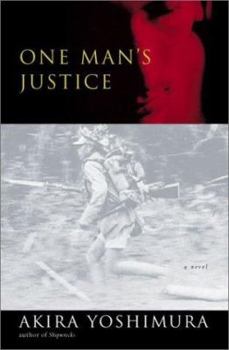One Man's Justice
Select Format
Select Condition 
Book Overview
Japan just after World War II is the setting for this searching and provocative novel. Takuya, an officer in the former Imperial Army, is only mildly surprised when he receives a postcard asking him... This description may be from another edition of this product.
Format:Hardcover
Language:English
ISBN:0151006393
ISBN13:9780151006397
Release Date:August 2001
Publisher:Houghton Mifflin
Length:288 Pages
Weight:1.06 lbs.
Dimensions:1.1" x 5.6" x 8.3"
Related Subjects
Contemporary Education & Reference Fiction Genre Fiction Historical Literary Literature & Fiction WarCustomer Reviews
2 ratings
life on the run
Published by Thriftbooks.com User , 20 years ago
Over the years, I have made an effort to try and read books that give me perspective of "the other side". Since I have had such a compelling interest in WWII, this has led me to try German and Japanese authors who can relate what it was like from their perspective. Often, I was disappointed in what I read; too much of it seemed "cleansed" or overly self-critical. In Akira Yoshimura's "One Man's Justice", I believe that I have gotten the type of perspective that I have been looking for. In finding that perspective I found myself uncomfortable, at times, with this book. The gist of the story is that of a lower level Japanese officer who actively took part in the execution of US airmen prisoners of war towards the end of WWII. After the war comes to a surprizingly abrupt end, the participants in the execution eventually get word that the US occupying forces are out to bring all war criminals, including this bunch, to justice. Our "hero", Takuya, attempts to avoid prosecution by fleeing and attempting to set up a new identity. Much of the book is a sort of suspense novel as Takuya has to keep on the run. Eventually he finds a job with a very ideal employer. The pay isn't great but the security is all Takuya is looking for. Eventually, this safe haven comes apart and Takuya must eventually face his accusers. I will let the reader find out for themselves how all of this turns out. I mentioned feeling uncomfortable, at times, with this book. I guess there were several aspects. One issue that certainly is open to discussion is the US bombing of Japan towards the end of the war. Specifically mentioned were the incendiary bombing of Tokyo and, of course, the two atomic bombs that were dropped. Takuya and his comrades felt justified in executing the downed US airmen because they had specifically targeted women, children, and other non-military personnel for their victims. To the Japanese, this was unheard of; or so we were to believe. I read a book entitled "The Rape of Nanking" several years ago which disturbingly detailed the treatment the Japanese soldiers dealt to the Chinese civilians and women in particular. The fact that this was carried out by foot soldiers instead of airmen is, to me, immaterial. Nonetheless, the author tells the story as if only the US military was guilty of targeting non-belligerents during the war. Of course, the fact that our "hero" knowingly committed the acts that he did made it difficult to sympathcize with him. However, I freely admit that, as the book progressed, I found myself hoping that he would succeed in his new lifestyle. Finally, the portrayal of the US soldier of occupation was fairly negative. They came across as drunks, rapists, and bullies. Conversely the policies of the US occupying forces found favor with Takuya. This was an ironic twist because, in the beginning, it was the US soldier that was portrayed in a positive way while the US government was portrayed as bad. After getting
...aka The Fugitive
Published by Thriftbooks.com User , 23 years ago
PUBLISHED IN JAPAN in 1978, this is the third of Yoshimura's provocative novels to appear in translation. Set over the decade following the end of WWII (and with flashbacks to the final days of the war), the novel explores themes of patriotism and war though Kiyohara Takuya, a Japanese officer on the run from occupying American forces. He is wanted as a war criminal for his role in the execution of American POWs in the waning days of the war. The story is a fairly gripping "The Fugitive"-like story, as he tries to figure out who he can trust and what part of Japanese society he can hide himself in. As he tries to survive while staying anonymous, the hardships of postwar Japan are vividly evoked, especially the specter of starvation. All the while Takuya watches the newspapers for stories on war criminals and any former comrades.The book is apparently based on historical incidents-a number of flashback sequences detail the ordering of executions by high-ranking officers. What American readers might find unsettling however, is the rationale for the executions, that the bomber crews were deliberately targeting civilians, and thus not subject to POW rules of treatment. Indeed, while the Allied firebombing of Dresden is well known, the firebombings of Japanese cities are relatively forgotten episodes of the war which Yoshimura plainly seeks to remind the reader of. The atomic attacks on Hiroshima and Nagasaki are portrayed as massive exclamation points on the indiscriminate bombings, and it becomes disturbingly easy to understand the retaliatory executions. At times the prose gets a little wooden, especially over a few pages that list the numbers of bomber sorties and subsequent casualties, but on the whole the sparse style perfectly captures Takuya's internal terror. In the end, the true subjectivity and relativity of justice are exposed.






